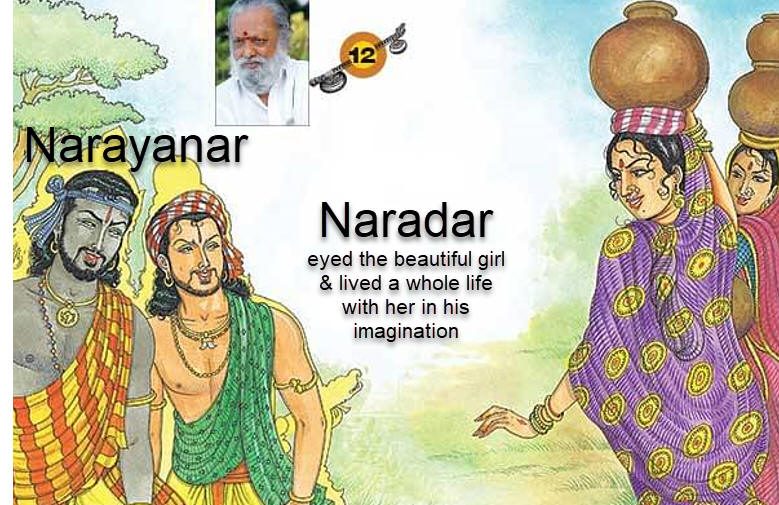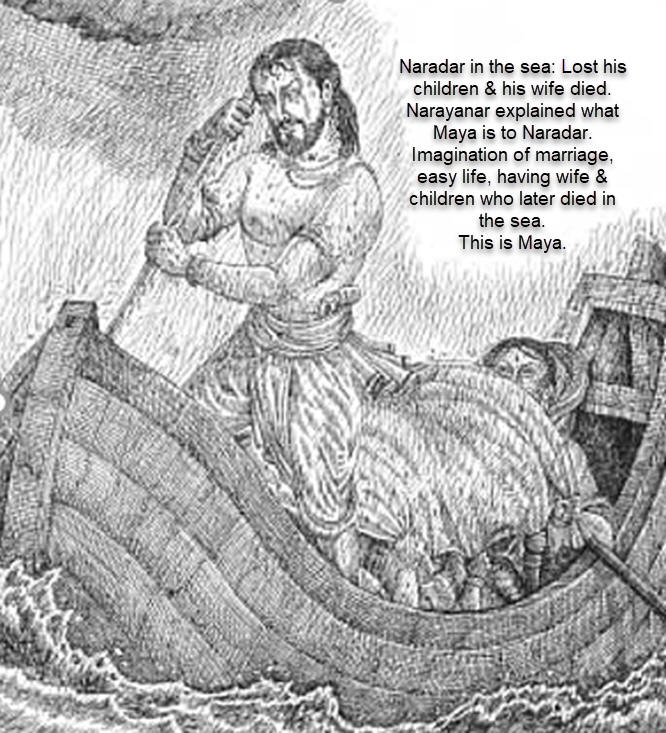Published:16 Sep 2013 8 PMUpdated:16 Sep 2013 8 PM Sakthi Vikatan
The Essence of the Four Vedas. Author: Wordsmith Balakumaran
1. Vaikunta Narayanar got wind of Naradar's greatness regarding his advice to the people according to their individual needs, lessons with instructions, and guidance to take virtuous paths.
2. Narayanar was happy that his devotee Naradar roamed the worlds, receiving accolades. He discovered that Naradar's performance was unsatisfactory on some issues.
3. Narayanar appeared when Naradar was doing his usual peregrinations in a village. Seeing Narayanar, Naradar was ecstatic, circumambulated Narayana, and fell at his feet prostrate often. With opposed palms, he eulogized him in songs and paid homage.
4. Naradar: "People say you are the God who appears in person upon invocation. You exist in my thoughts always. But I did not invoke you just at this moment. You appeared now without being called. Is it for my benefit or yours? "He addressed Narayanar, thus with humility.
5. Narayanar: "You seem to conduct your lessons well."
6. Naradar: "all because of your grace."
7. Narayanar: "You seem to have the righteous zeal to establish multifarious justice, discipline, and morality."
8. Naradar: "Thank you for your accolades. Without your blessings, could I ever carry on?"
9. Narayanar: "But, the teacher should know all before he offers lessons."
10. Naradar: "Now I see. You keep your dagger in your hand at the ready. You have not sheathed it in your waist. If you kindly sheath it, I will appreciate it. It is true I conduct classes and offer lessons. But I don't know what I never experienced."
11. Narayanar: "If that is so, do you think you know it all."
12. Naradar: "I don't say that. I am saying I don't know what I don't know. Is there not a difference between 'I know it all.' and 'What I don't know?'"

13. Narayanar: "You are quite modest."
14. Naradar: "All because of your grace. Yes, You may pose questions, though I am in a sticky predicament, and you come to taunt me. What mistake have I made? Or you may be thinking I became arrogant because of my service, and you are here to wipe clean my arrogance. I am ready." Naradar vented his feelings. Narayanar laughed.
15. Naradar continued. "I agree I have some doubts. Some questions roil me, but I have no answers. May I ask you my first question?"
16. Narayanar: "Ask me, Narada! Who else will I answer, other than you?"
17. Naradar: "What does Māyai mean? What is Māyai? You are standing before me and come upon my invocation. I stand before you. We are having a conversation. Both have clarity of mind and thoughts. We can see this village, this earth, and the sky clearly. The Devas do their assignments. People live happily. The violators suffer punishment and get rehabilitated. All are happening in an orderly and beautiful manner. Where is Māyai in all these events? I don't understand. Beyond these events, how could a person suffer Māyai or mental delusion?"
18. Narayanar: "Good question. Whosoever understand this life's essence , they will be the learned and the wise. You asked such a wonderful question. Come. Let us take a walk. I will answer your question." Both of them walked.
19. Coming from the opposite direction were the women carrying the water-pot, and so Narayanar and Naradar moved to the side. The women, bowing their heads and seeing the two men by the corner of their eyes, passed them. One woman bringing up the rear swung her hands and strutted jauntily. Seeing Naradar, she strolled by Naradar and said, "You look handsome."
20. Abundance of her beauty, the grace of her body parts, big wide eyes, thick lips, pearl-like teeth, here carriage, agility, and style of holding the water-pot blew him away.
Naradar thought, "O my God! Here on earth, a woman looks like a celestial. I must get marrier to her." Thinking such thoughts, he turned towards Narayanar.

21. Narayanar: Hey. A woman for whom else but you! Go ask her." Naradar refused to follow the request of Narayanar. Naradar followed her to her house and announced who he was. The father and others came forward joyously to marry the young woman to Naradar. The girl also jumped at the prospect.
22. That evening the wedding took place. The bride's family gave a house exclusively for them. Hearing his melodious music, many gave him presents. Naradar singing songs of praise on Narayanar received very many rewards, with which Naradar filled the house with household goods. He bought his wife good clothes and jewels. They ate well. Day and night, he enjoyed life with his wife and begot children.
23. They begot in all 16 children. Everyone was a gem of a child. They sang and spoke wonderfully. The family sang songs of eulogy to Narayanar and the village, astounded, said, "What an astonishing family!" His wife played on Tambura, Naradar sang and the children joined in the chorus. The other children joined the Naradar children in the chorus: Gandharva Ghanam." The village spoke in praise of the Naradar family.
24. Naradar's Narayana Ghanam spread all over the world. Many nations' kings invited Naradar to sing in their hall. Naradar traveled from one kingdom to the next with his wife and family, who responded to invitations everywhere. The Naradars received ceremonial welcomes given to deities in the temples. They gave them ceremonial clothes, crowns, gold armlets and anklets, garlands, and gold chains, especially to the children. Fame and name came to Naradar.
25. Once, it thundered and rained. Naradar locked the front door of the palatial house and wanted not to go out. It rained hard, the streets and the village flooded, and the sea entered the town. The people panicked.
The river flooded over the banks, but the rain did not let up. The river water blew away all the huts and threatened to enter the houses and palatial houses.
26. Naradar did not know what to do. He got a big boat ready to ply the children out of danger. His wife paddled the boat and all reached the outskirts of the town but the rain came thrashing on the ground pushing the boat into the sea. The waves roiled the boat, throwing many children out of the boat. Naradar cried, "O my children."
27. Naradar: "She used to sing well. See her go on the waves. Is there anyone to save her?" He cried with tears. All the children fell out of the boat and died one by one. A plank from the boat flew away, hit his wife on the head, and caused her death. Her dead body rolled out of the boat into the sea. Naradar remained in the boat all alone.
He cried, "All are gone." Suddenly, he awakened (from an awful dream).
28. Narayanar: "What was gone? What do you mean? Is it the water that you want? Can I call her back? "Hearing Narayana query him, Naradar fell at his feet.
29. Naradar. He said, "Don't ask her to return. Even before the water-bearers footprints dried, I lived a life. Time lives in our mind and is different for each living species. A worm can think it lived for a hundred years. A man can think and know how many years he lived. In reality, we do not know what time is."
30." In a few moments, I lived to a ripe old age and underwent a multiplicity of experiences. I fell in love with a wodiversity life with her. What we love becomes our life and attaining it is full of anxiety. Time weaves on a thread those anxieties, that becomes our life."
31. "Life without desire: that is real life. Life with no encumbrances is life. I had those attributes as the celestials had them, though I gave them up and forgot about them for a moment."
32. "This is Māyai. It lets loose its tricks on the hapless person like me who knows the ins and outs of Māyai, has the best of education and is a polymath. Narayana! You are the only one not entangled in Māyai. Only by holding on to your feet, one could escape getting entangled in the web of Māyai. Let not any desire creep into me, so no worry will afflict me. Narayana, Narayana! Protect me so I am not caught up in any Māyai." Saying such words, Naradar fell at Narayana's feet and cried.
33. Narayanar raised Naradar from the floor and said, "You are Chiranjivi! All that you said have the qualities of a Chiranjivi. Tell those who need to know Māyai. Let whosoever understand it, know it. "
34. Narayanar: "Whosoever asks what Time is, tell this story. Those who ask what life is, tell them it ends in a flash. Time is what we thrust on ourselves, a capsule that imprisons us, which differs from True Time. Let them know it."
35. Narayanar: Narada! Tell all your story. Your lesson concludes. You are a great Jñāṉi." With comforting words, Narayanar embraced him.
36. Naradar's experience is a subtle matter.